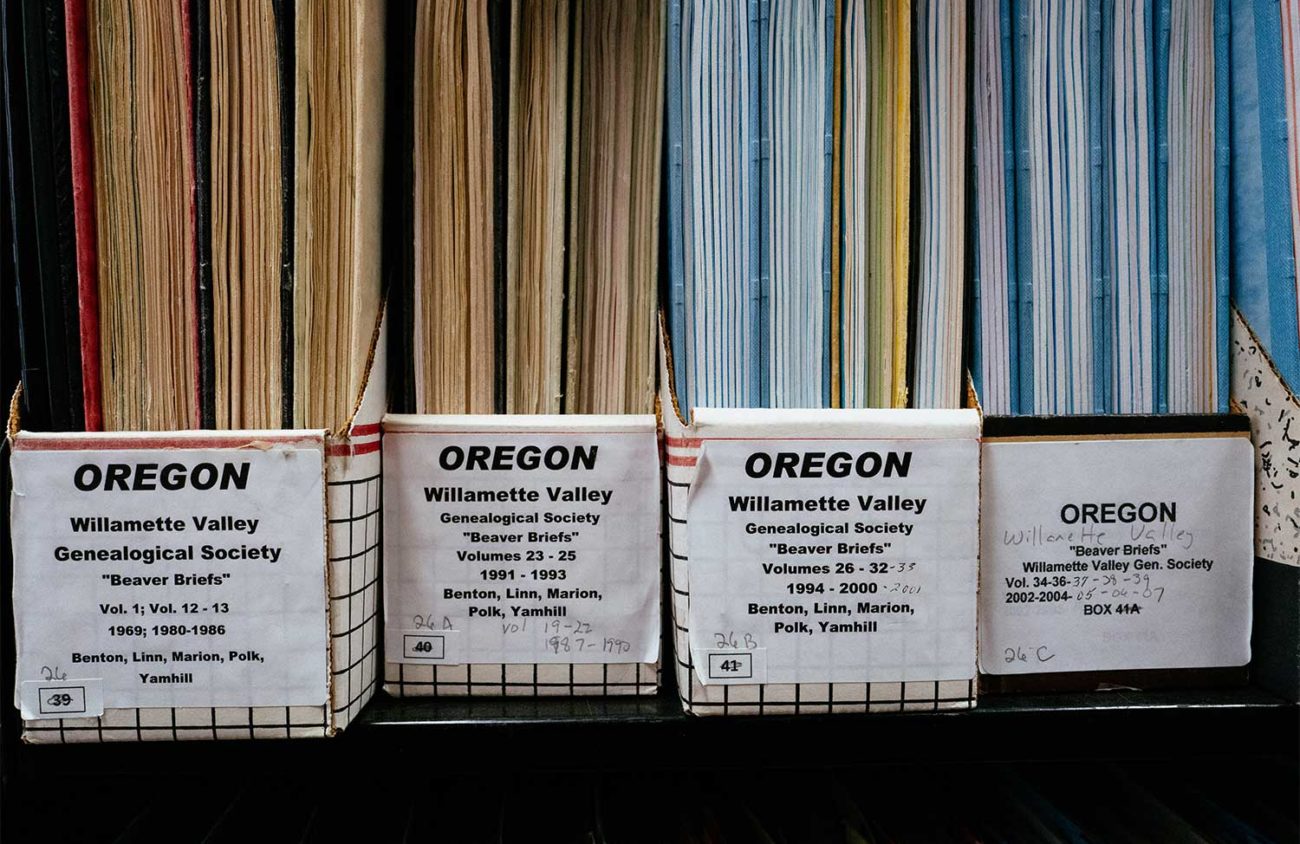Dawn Carlile wanders through the aisles of periodicals and papers stacked high on shelves at the Oregon Genealogical Society in downtown Eugene.
With more than 10,000 items and 3,000 periodicals, Carlile — OGS’s vice president — declares that “We have something for almost all states in the U.S.,” as well as “some collections from other countries,” be they European, Asian-Pacific or Central American.
She, along with other staff members at the OGS, will preach, with an almost religious zeal, the educational benefits as well the joy of genealogy, of locating hard-to-find records and putting the puzzle pieces of a family together. When talking earnestly about research and discoveries of her own family, Terri Thompson — who chairs the research and certificate committees at OSG — sometimes has to laugh, pause a moment and backtrack. “I’m going too fast,” she confesses.
The 25-member all-volunteer staff, steeped in the knowledge of research from both professional and personal projects, is ready and willing to help others in their genealogy searches, and they are also ready to celebrate OGS and get the word out about its work with a 60-year anniversary gathering Sept. 24.
The pandemic was difficult for OGS and for other genealogy societies, Carlile says. Some societies closed, she notes, while others — even with Zoom — saw attendance drop dramatically.
OGS managed to slug its way through COVID-19 via donations (“We did not believe it would last long,” Carlile says of the pandemic). Now that restrictions have eased, and in-person classes and workshops will resume with limited capacity (and with Zoom links available to those who wish), the society offers beginning genealogy classes as well as classes on how to research cemetery, tax, probate and immigration records, not to mention classes on how to understand and use DNA results.
That’s just for starters. OGS has hybrid seminars on the calendar, handles research requests and offers Oregon Pioneer certificates (proof of a direct lineage to Oregon to Oct. 31, 1872) and Early Settler certificates (proof of a direct lineage to Oregon from Nov. 1, 1872 to the end of 1900).
“I think this is important to the family member doing the research,” Thompson says. “It shows that there was an ancestor in Oregon at a certain point in a certain time.”
OGS also is a FamilySearch Affiliate Library to the Family History Library in Salt Lake City, Utah, and its vast, world-renowned collection of books, films, images and documents.
So who’s the typical person to walk into OSG and begin the process of researching ancestry?
“A lot of people start researching ancestry after they retire,” Carlile says, perhaps triggered by a close family member who died. The internet, she adds, has led people in their 30s to start a deep dive into a family’s past, and Carlile is quick to counter the narrative that researching ancestry is not for younger people. “We would love to have young people join,” she says.
The results of the research can be amazing, Carlile notes, and sometimes for jolting reasons. Be it information about ancestors from the Deep South or how some Europeans treated Jews even before World War II, there can be eye-opening revelations.
“That doesn’t faze us,” Carlile says, adding that the historical actions of people from generations past is not a reflection on the researcher today. “You can’t do genealogy without knowing history.”
Thompson knows this from having done research into her own family. Most of her research experience, including DNA testing, has been positive, she says, though there is one exception she politely declines to discuss.
What Thompson talks about enthusiastically is an indirect DNA match that reunited her with her now 91-year-old half great aunt, Maria Doralba (Tufo) Dito. Thompson’s first memories of Dito were when she was a girl visiting the Italian relatives in San Francisco.
Thompson and her husband in 2019 accompanied Dito to Verbicaro, Italy, a small town of just over 3,000 people in the mountainous region of southern Italy, to close the family farm. Dito now lives in El Cerrito, California, where she’s in failing health, and Thompson says she is grateful for her time with Dito.
She is also enthusiastic about her time on the certificate committee where, among other current applications, are the Oregon Pioneer and Early Settler certificate applications of Linda Aubrey, a past president of OGS.
Thompson notes that OGS has certified 4,000 Pioneer certificates (though some could be duplicates from multiple family members) and 400 Early Settler certificates.
Carlile, who has taught classes at OGS for 10 years, emphasizes that a newcomer should not be daunted by the complex nature of the research work. An administrative assistant before retiring in 2019, Carlile notes that anyone who is thoughtful and methodical can succeed in genealogy.
“It is amazing to see the people doing professional research,” she says.
The Oregon Genealogical Society 60th Anniversary Celebration is 1 to 3 pm Saturday, Sept. 24, at the Oregon Genealogical Library, 955 Oak Alley. The event is free. More information about OGS can be found at OregonGS.org.
